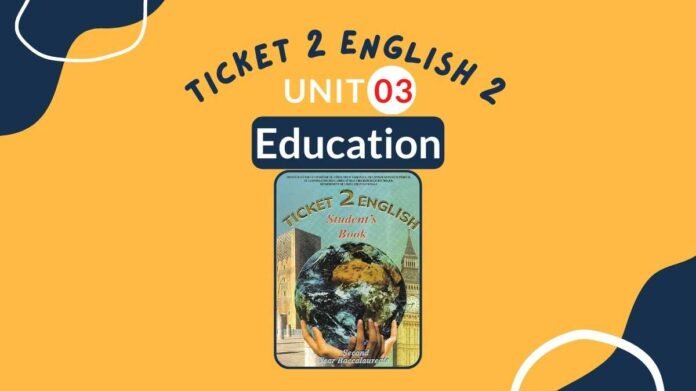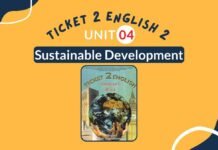In this post, you will find a brief yet comprehensive summary of “Ticket 2 English Unit 3 Education”. The summary covers crucial elements such as vocabulary, functions, grammar, and writing. By the end of this summary, you will understand what to expect from this unit and what you need to know to get good marks in your exams in English.
Table of Content
Vocabulary Ticket 2 English Unit 3 Education
Types of Education
There are many types of education, but the most frequent ones are Formal, Non-formal, and informal education.
- Formal education: refers to the types of learning that are taking place in an educational institution, where there is a syllabus and a teacher, and is usually recognized in a qualification or a certificate.
- Non-formal education refers to learning through a program (like formal education ), but it is not usually evaluated and does not lead to certification.
- Informal education: refers to any learning resulting from activities related to our daily life.
- Vocational education: Prepares learners for careers or professions related to a specific trade, occupation, or vocation
- Special education: Describes an educational alternative that focuses on the teaching of students with special (behavioral, health, academic, or physical) needs that can not be met using traditional programs or techniques.
- Inclusive education: It addresses the learning needs of children, youth, and adults, especially those who vulnerable to marginalization and exclusion
- Gifted education: is a broad term for particular practices, procedures, and theories used in the education of children who have been identified as gifted or talented
- Basic education: The whole range of educational activities taking place in various settings (formal, non-formal, and informal) that aim at meeting basic learning needs such as reading, writing, and arithmetic
Examples of Education
- Formal education: Secondary school vocational training workshop-university studies.
- Non-formal education: Evening classes, literacy classes.
- Informal education: Theater, television, daily life in general.
Collocations
A collocation is a pair of words that generally goes or occurs together. Here are some related to education.
Educational system/goals/background
School subject/year/uniform
Private lessons/institution/school
Equal opportunities/rights/status
Other Collocations:
- higher education
- university graduate
- free classes
- learning needs
- mixed classes
- cultural background
- adult illiteracy
- Higher education
- Primary education
- Secondary education
- Vocational education
- Distance learning
- E-learning
- Lifelong learning
- Inclusive education
- Special education
- Educational technology
- Educational research
- Educational psychology
- Student achievement
- Curriculum development
- Educational policy
- Teacher training
Functions: Expressing Purpose
Expressing purpose can be done in different ways, some of them are with: To, In order to, so as to, So that, In order that, For, In case, and Lest.
Expressing Purpose With To + Infinitive
- He joined a language center to learn English. (The purpose behind his joining a language center was to learn English)
- She went to the library to study. (The purpose behind her going to the library was to study)
- They stopped to talk to him (the purpose behind their stopping was to talk to him)
Expressing Purpose With In Order To + Infinitive
- He joined a language center in order to learn English. (The purpose behind his joining a language center was to learn English)
- She went to the library in order to study. (The purpose behind her going to the library was to study)
- They stopped in order to talk to him (the purpose behind their stopping was to talk to him)
- He joined a Gym in order not to get fat.
- She woke up early in order not to be late for school.
Expressing Purpose With So As To + Infinitive
- He joined a language center so as to learn English. (The purpose behind his joining a language center was to learn English)
- She went to the library so as to study. (The purpose behind her going to the library was to study)
- They stopped so as to talk to him (the purpose behind their stopping was to talk to him)
- He joined a Gym so as not to get fat.
- She woke up early so as not to be late for school.
Expressing Purpose With So That + Subject + Modal Verbs
- He joined a language center so that he could learn English. (The purpose behind his joining a language center was to learn English)
- She went to the library so that she could study. (The purpose behind her going to the library was to study)
- She goes to the library so that she can study.
- They stopped so that they could talk to him (the purpose behind their stopping was to talk to him)
- He exercises regularly so that he will not get obese.
- She woke up early so that she would not be late for school.
Expressing Purpose With In Order That + Subject + Modal Verbs
- He joined a language center in order that he could learn English. (The purpose behind his joining a language center was to learn English.)
- She went to the library in order that she could study. (The purpose behind her going to the library was to study)
- She goes to the library in order that she can study.
- They stopped in order that they could talk to him (the purpose behind their stopping was to talk to him)
- He exercises regularly in order that he will not get obese.
- She woke up early in order that she would not be late for school.
Expressing Purpose With For + Gerund or Nouns
- I exercise for pleasure.
- This lesson is for explaining purpose.
- A key is a tool for opening doors.
Expressing Purpose With In Case
In case means in order to be prepared for something that may happen
- I’ll make a sandwich in case you are hungry
- She keeps aspirin in her house in case she feels sick.
Expressing Purpose With Lest
Lest means for fear that or with the intention of preventing. It is usually used in formal written English
- People are afraid of going out lest they get infected by the COVID-19 disease.
- She was worried lest she had a bad mark on the test.
Grammar: The Past Perfect
Click here to see THE PAST PERFECT LESSON.
Writing: A Report
A report must at least contain these elements:
- Place of the event.
- Time of the event.
- Attendants or people who participated.
- What happened.
- Your evaluation/opinion.
Also, when writing a report, keep in mind the following:
- Identify your audience. Who will be reading your report? Consider their age, interests, and level of knowledge about the topic you are writing about.
- Gather and organize your information. Collect relevant data and sources, and organize them logically and transparently.
- Write a clear and concise introduction. Introduce your topic, explain the purpose of your report, and provide an overview of the information you will present.
- Use linking words to break up the text and make it easier to read.
- Conclude your report with a summary of the main points and any recommendations or conclusions you have drawn.
- Edit and proofread your report carefully to ensure it is free of errors and easy to understand.
Usually, the topic is as follows: Write a report about………..
Last………. (write the date) ……… I attended / there was a…….. (name the activity)…….. It took place in ………(country, city, place)………… The …. (event)…. was about ………………… Several people attended it, and approximately ……(number of the attendants)……….. were present. The activity continued for …………….. (say, for example, 4 hours, half a day, two days, one week, etc.) ………………………… There were different activities during the event, such as …………………(say what happened throughout the event)……………………… Finally, I …………………. (give your opinion/evaluation of the event)…………………because it was time for me to (give some reasons to justify your evaluation)
Example of a Report on a Seminar on Dropout Students
Last week I attended an interesting seminar. It took place in the conference room at our school. The seminar was about dropout students. Several people attended it, and approximately 100 people were present. The activity continued for 4 hours. There were different activities during the event, such as discussions and interactive activities. Finally, I liked this event because it was time for me to broaden my knowledge on this issue and meet new people.
Example of a Report on a Seminar on Dropout Students (2)
Last week, our school held a seminar on dropout students. The seminar brought together educators, policymakers, and community leaders to discuss the issue of dropouts and identify solutions. The keynote speaker highlighted the importance of addressing dropouts. Several other speakers presented various aspects of the dropout problem during the seminar. The discussions and interactive activities at the seminar generated several ideas and strategies for addressing dropouts. One suggestion was to provide more support and resources for students from disadvantaged backgrounds. Another idea was to involve parents and the community in the education process actively. Overall, the seminar emphasized the need for a comprehensive and multi-faceted approach to addressing the issue of dropouts.




Really great and very informative
Thanks you so much teacher
my pleasure 🙂
THANK YOU MS NABIL
Most welcome 🙂
By the way, Ms = single or married female person 😀
That’s great my teacher Nabil .. this helps me a lot , thank u so much
Most welcome. This was the objective. 🙂
thank you for your great help and efforts Mr nabil. May all bless you
My pleasure dear teacher
Thank you Teacher ❤
wow thanks you so much for this piece of informations 🙂
Great effort indeed. Thank you
You are welcome Mt Anonymous 🙂
there is a mistake (in the example of “in order to ” : “to” is missed)
Thank you so much for this amazing website
It’s a pleasure 🙂
It’s Useful website even for teachers. May Allah bless you and grant you the best in your life.
Thanks Mr. Anonymous 🙂